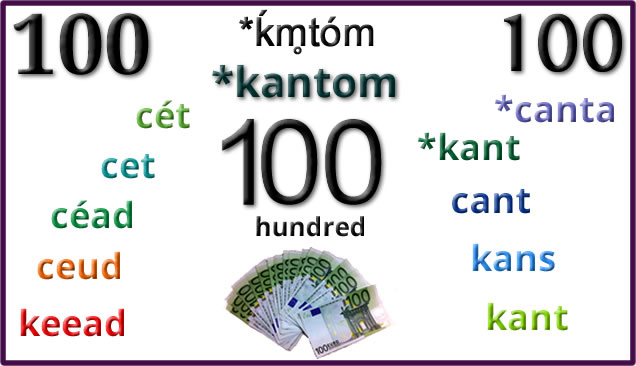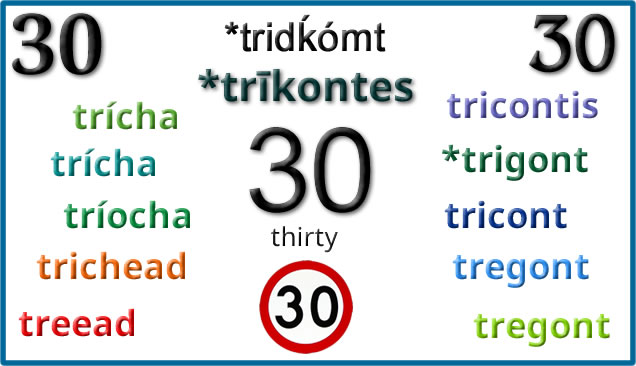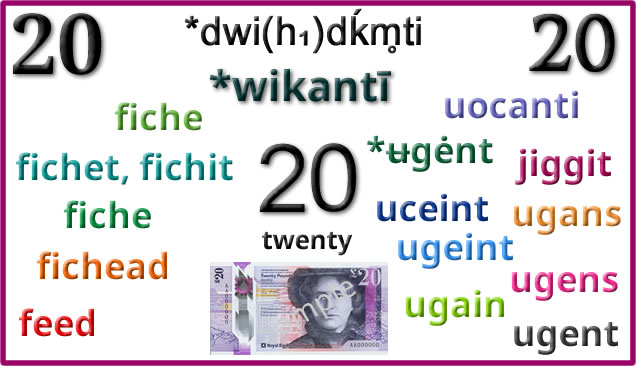Words for near, close and and and related things in Celtic languages.
Words marked with a * are reconstructions.
| Proto-Celtic | *adgostus = near |
|---|---|
| Old Irish (Goídelc) | ocus [ˈoɡus] = near, close, nearness, proximity, and |
| Middle Irish (Gaoidhealg) | ocus, acus = and, near, nearness, proximity com(ḟ)ocus, comacus = near, proximate, neighbouring; equidistant, proximity; relationship focus = near, close bean fagas, bean ḟogas = kinswoman |
| Irish (Gaeilge) | agus (⁊) [ˈɑɡəsˠ/ˈaɡəsˠ] = and, while, although, as agusóir = halting, inarticulate, speaker aguisín = addition, addendum fogas [ˈfˠʌɡəsˠ] = nearness, closeness, near, close fogasghaol = near relationship, near relative foisceacht = nearness, proximity bráthair fogas = near kinsman |
| Scottish Gaelic (Gàidhlig) | agus (⁊) [agəs] = and, plus, as, while, although agusan = Tironian/Gaelic ampersand (⁊) fagas [fagəs] = close, near fagasg [fagəsg] = proximity, nearness fagasachd [fagəsəxg] = adjacency, nearness, proximity fagasach [fagəsəx] = adjacent faisg [faʃgʲ] = close, near faisgead [faʃgʲəd] = degree of nearness/proximity |
| Manx (Gaelg) | as = and, as faggys = almost, close, contiguous, handy, near, nearby, neighbouring faggys-yalloo = closeup faggysaght = adjacency, nearness |
| Middle Welsh (Kymraec) | agos = near, close agoseieit = close relations or friends |
| Welsh (Cymraeg) | agos [ˈaɡɔs / ˈa(ː)ɡɔs] = near, close, almost, nearly, on the verge of, about to agosâd = a drawing near, approach agosaf, agosi = to draw near, approach agosaol = approaching agoseiaid = close relations or friends agosiad = close relation or friend agosrwydd = closeness, nearness, proximity agoster = closeness, nearness, proximity |
| Old Cornish | ogos = near, close |
| Middle Cornish (CerneweC) | ogas, oges, ogos, agos = near, neighbouring |
| Cornish (Kernewek) | ogas = adjoining, close, near, almost, nearly, vicinity ogas ha = approximately ogas lowr = approximate yn ogas, en ogas = closely, nearby ogasti, ogatti = almost, nearly |
| Old Breton | ocos = near, close |
| Middle Breton (Brezonec) | hogos, hegos, ogos, egos = almost, barely, close, near hogoster, hogosder = proximity hogozik, hogosicq, hogosic = almost, close, near |
| Breton (Brezhoneg) | hogos = near, close, almost hogosder = proximity |
Etymology: from Proto-Celtic *ad- (to, at towards), from Proto-Indo-European *h₂éd (to, at), and PIE *ǵʰes- (hand, to take, give in exchange) [source]. Words from the same PIE roots include chiropractor, host, million, surgeon and words beginning with kilo- and milli- in English [source].
| Proto-Brythonic | *atkʷe = and |
|---|---|
| Old Welsh | ha, hac, hay, ac = and |
| Middle Welsh (Kymraec) | ha, a, hac, hay, ac = and |
| Welsh (Cymraeg) | a, ac [a(k), a(ɡ)] = and, considering, in view of a(c) … a(c) = both … and, not only … but also |
| Old Cornish | ha = and |
| Middle Cornish (CerneweC) | ha(g), a = and |
| Cornish (Kernewek) | ha(g) [ha(ɡ)] = and, plus, while hag erel (h.e.) = etc. hag oll = moreover |
| Old Breton | a, ha, hac = and |
| Middle Breton (Brezonec) | ha, hag, ham, haz = and hag all, ha a, hag e-se = etc. |
| Breton (Brezhoneg) | ha(g) = and hag all (h.a.) = etc. |
Etymology: from Proto-Indo-European *h₂ét-kʷe. The Latin word atque (and, yet, nevertheless, as, than) comes from the same root [source].
Sources: Wiktionary, Etymological Dictionary Of Proto Celtic, In Dúil Bélrai English – Old Irish glossary, eDIL – Electronic Dictionary of the Irish Language, Teanglann.ie, Am Faclair Beag, An etymological dictionary of the Gaelic language, Fockleyreen: Manx – English Dictionary, Online Manx Dictionary, Gaelg Corpus, Geiriadur Prifysgol Cymru, Lexicon cornu-britannicum : a dictionary of the ancient Celtic language of Cornwall, Gerlyver Kernewek, Devri : Le dictionaire diachronique du breton, Dictionaire Favereau, TermOfis












